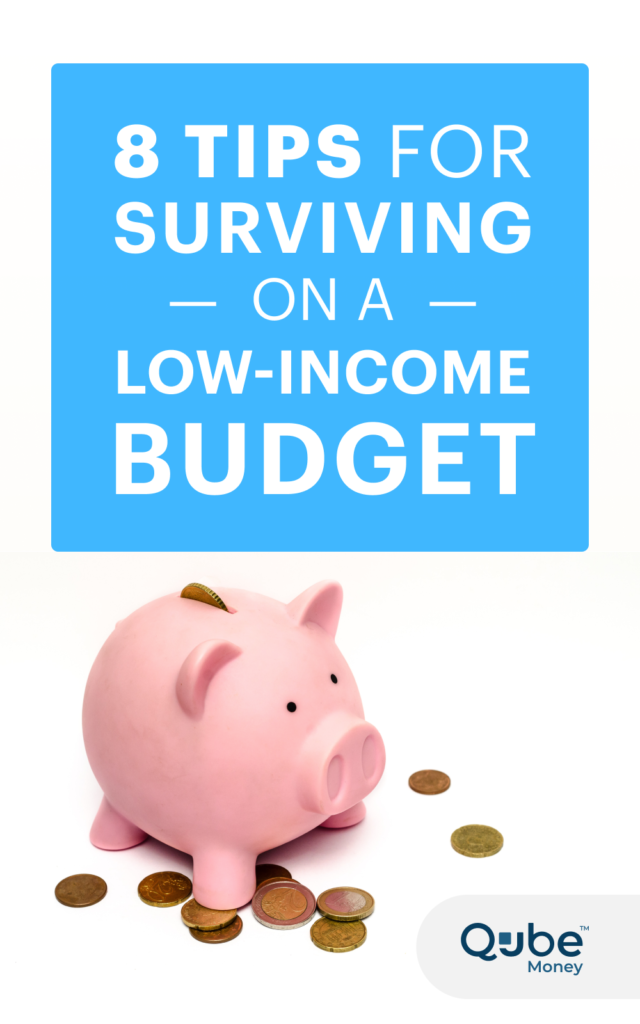Living on a low income budget is especially tough. You’re probably already not spending as much as others, and so suddenly having to live on an even more restrictive budget can make that crunch seem even worse. It doesn’t seem fair.
If you’re in this situation, know this: you absolutely are NOT alone, and things might not feel better overnight. But one of the defining strengths of humans as a species is that we’re remarkably adaptable.
It’s possible to get over this hurdle. To prove it, we spoke to several bloggers about how they dealt with living on a low income budget, and how you can make it work for you too.
Set Short-Term and Long-Term Goals
“The biggest thing that has helped me during periods of living below the poverty line has been goals,” says Brynne Conroy at Femme Frugality. “If you don’t have those short-term goals to make you feel secure today, you’re going to lose hope in those long-term goals.”
Having short-term and long-term goals can serve you in many ways. Get clear about where you want to go in the long run and make a plan to get there. That plan can include short-term goals as stepping stones. Each short-term goal you accomplish helps sustain you for the marathon and gives you a real sense of accomplishment.
Related: How To Set Financial Goals in 2020
As for Conroy, her long-term goal included going to college. But first, she had to complete her short-term goals, which included things like getting enough money together to pay for groceries or paying off the electric bill. Once those beasts were slain, it was a path to bigger and better things.
Focus on One Thing at a Time
Getting your finances in order on a low income seems overwhelming. From setting up your budget, finding low-cost meals, making sure you have enough insurance, and then figuring out how to pay for that insurance — and more — it’s too much sometimes.
“It seemed that if I tried too many strategies at once, I gave up because it seemed impossible,” says Melanie Musson, a writer at QuickQuote.com. Instead, she focused on one thing at a time, beginning with paying off one of her credit cards.
“It’s funny, but I honestly felt like if I could pay off one credit card, I could almost do anything. The success also motivated me to spend less and avoid more debt. That was an organic result that I didn’t have to write out and plan for. As long as I was focused on one debt, the decrease in spending naturally followed.”
Here’s the truth: you don’t have to solve everything overnight. Sometimes, it’s better to take small steps and focus on one thing at a time. Over time, those small tweaks can add up to big changes for the better.
Find One Quick Win
Similarly, you don’t necessarily have to focus on a big goal to start. Sometimes, all it takes is a little quick win to get the ball rolling.
“Once I started tracking my income, my goal was to find one area I could improve on immediately. One quick win. That quick win was on food, specifically fast food,” says AJ from AJ Mobile Money, who was shocked to find out he was spending $200 per month on lunch takeout.
Related: My Food Budget Is Out of Control
Instead, he gradually started bringing more lunches to work. From $200 per month on takeout, he dropped his lunch costs down to $100, and then a mere $50 — giving him an extra $150 in his budget. “After this, I felt I could now do it for other areas of my life, and maybe those areas wouldn’t be as difficult either. One quick win!”
Focus on Value Over Price
Sometimes when you’re living on a low income, it’s easy to start seeing everything in terms of dollars — dollars that you can’t afford to spend. Instead of looking at the world in terms of things you’re missing out on, Christopher Tepedino, a writer at MyCarInsurance123.com, tried a different approach.
“For me, the question became: ‘Where are my dollars worth the most?’ The answer, surprisingly, was mostly things that cost little,” says Tepedino. “Hanging out with friends in homes instead of bars. Cooking instead of eating out. Exercising, watching Spanish-language TV shows while improving my Spanish, going to thrift stores instead of department stores.”
Move to an Area With a Lower Cost of Living
How far a buck stretches in today’s economy depends on where you live. You could be earning a six-figure income in some areas of the country and still be considered lower-income, whereas you could live like royalty on less than half that in other areas. If you have the ability to move and find a job using your skill set, packing your bags might be one of the best things you can do for your bank account.
Ask Amanda Grossman from Frugal Confessions, who hastily moved from lower-cost Maryland to expensive Florida to accept a new job after a company layoff.
“I was so eager and glad to get a job that I didn’t even take into consideration the major increase in the cost of living, coupled with a $3,000 decrease in income. And how much that would end up costing me financially and emotionally. I felt like I was treading water, and not getting anywhere financially.”
Finally, Grossman had enough. She moved to Texas with her boyfriend (now husband) where the cost of living was lower and her income was higher, and making ends meet became much easier.
Rebuild Your Budget From the Ground Up
“I lived way below the poverty line for a few years, during a bout of long-term unemployment. There were three main things that helped me: knowing what my expenses were, putting every single one on the table for elimination first and cutbacks second, and not being afraid to ask for help and discounts,” says debt-freedom blogger Jackie Beck.
Purging your budget of everything — and then slowly adding it back in, piece by piece, in accordance with your financial goals and your income — can be painful. There’s no doubt about that. But it’s like ripping off a band-aid. For a brief second of pain, you can allow yourself to fully heal and even grow going forward.
Related: Budgeting 101: How to Create a Good Budget
“It feels terrible to be trying your best and not getting ahead,” says Beck. “There’s a lot of judgment out there too, but it’s important to remember that you aren’t your bank balance. You’re a strong and resourceful person.”
Focus on a Side Hustle With Multiple Benefits
You’ve heard the tried-and-true advice of starting up a side hustle to earn more money. This can be especially helpful if you’re living on a low income.
But when it comes to side hustles, not all are created equal. If you have an open mind and you’re smart, you can magnify the impact of your side hustle far beyond the benefits you’ll get from the extra income.
“For me as a young, recent college grad, I found a side hustle that: 1) earned me money 2) saved me money, and 3) turned into my social circle,” says Sally French, a personal finance expert at Wirecutter.
“I love the gym, so I got a part-time job. It started at one hour a week. But, I got free gym access, allowing me to save money on a membership! It slowly grew into more hours as I gained experience. But I also find that I spend less money now that I spend all my time there. Instead of spending money on happy hours, I find myself hanging out with my gym friends — we’ll chat at the pool, take spin classes together, etc.”
French’s example is impressive, but you don’t have to be a fitness guru to find something similar that’ll work for you. For example, you could transfer your love of animals into a dog-walking side hustle where you earn more cash, get more exercise, and potentially make new friends. If you enjoy writing, you could start a blog, expand your social network, grow your skills, and freelance on the side for more money.
Focus on Being Grateful for the Things You Do Have
When you’re living on a low income, you become keenly aware that everyone around you seems to be living an abundant life while you’re barely making ends meet. It’s easy to focus on what you don’t have — and indeed, you don’t have most things (and neither does anyone else, by the way). But you can train yourself to overcome this bias by using a nifty reverse psychology trick.
“My husband and I have a lower household income than most of our friends, but we have a high quality of life,” says Suchot Sunday from The Curious Frugal. “One of the secrets to budgeting on a low income is to be happy with what you have, even if it’s less than what your friends have. It’s one of those things that sounds simple but isn’t easy. Gratitude for your own life is a muscle that can be developed.”
To do this, Sunday uses two approaches. First, she kept a gratitude journal where she wrote down five things she was grateful for every day. It can be something as silly as being healthy, not having an auto loan, or having a warm house to live in. After all, you’d miss those things if they were taken away from you, but you have them (or other things) now.
Secondly, if Sunday notices some jealousy creep up — for instance if a friend is able to afford a nicer house for their family — she instead focuses on what she does have. For example, her husband is happy with his job, and he’s home every night to spend time with her. Not everyone is so fortunate.
The Bottom Line
Living on a low-income budget can be tough. But it doesn’t have to be. By focusing on ways to live a bigger life on a smaller budget, you can overcome the difficulties.
Money isn’t everything, after all. It can make your life a lot easier, yes, but there are plenty of rich, miserable people out there.
Money is only a tool that can help magnify who you already are. So by focusing on the journey first, you’ll be that much more satisfied, regardless of your low income.






![Everything You Need to Know About the Cash Envelope System [+ Sample Budget]](https://blog.qubemoney.com/wp-content/uploads/2020/01/1-20-20-the-cash-envelope-system-blog2-440x264.png)

